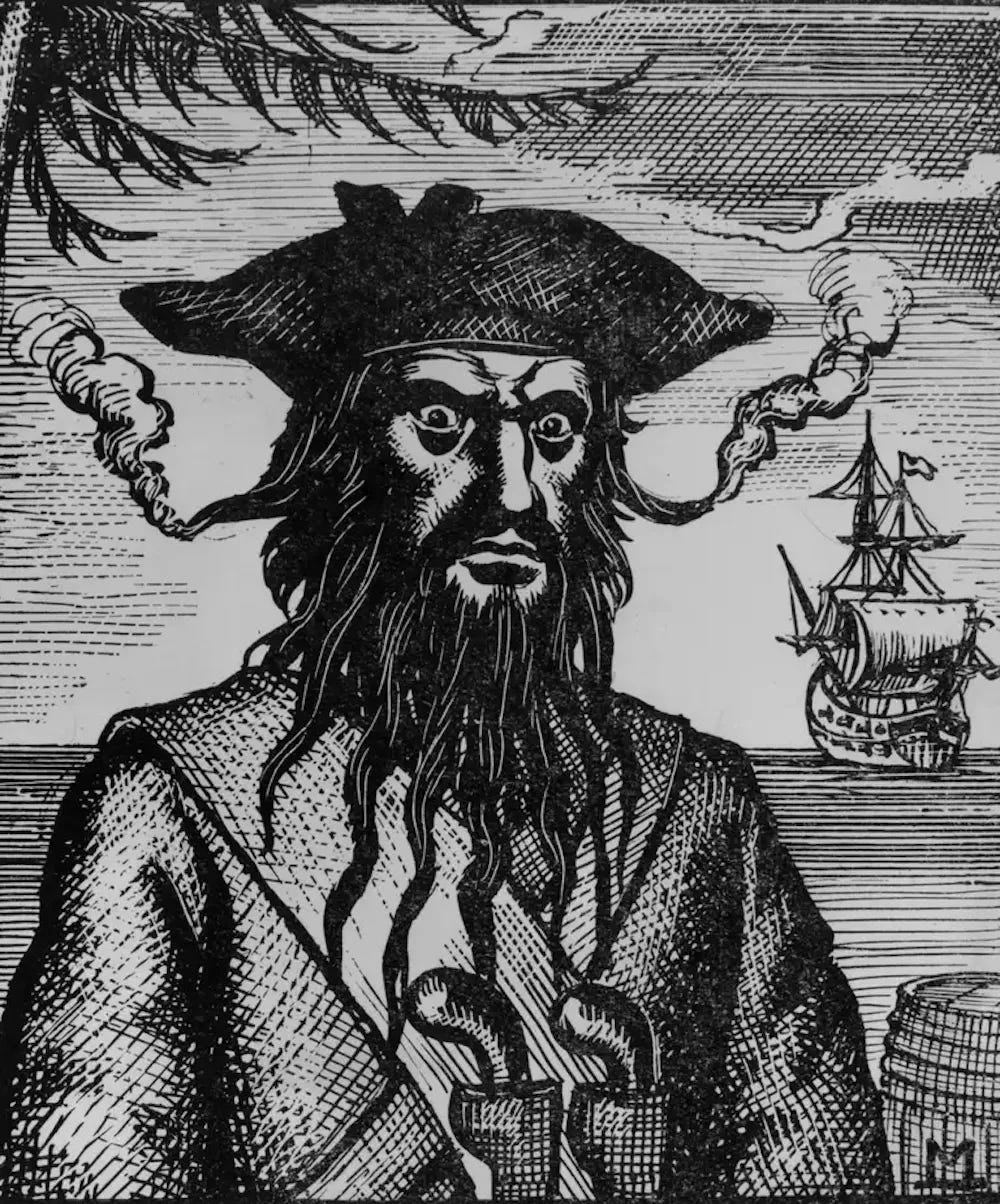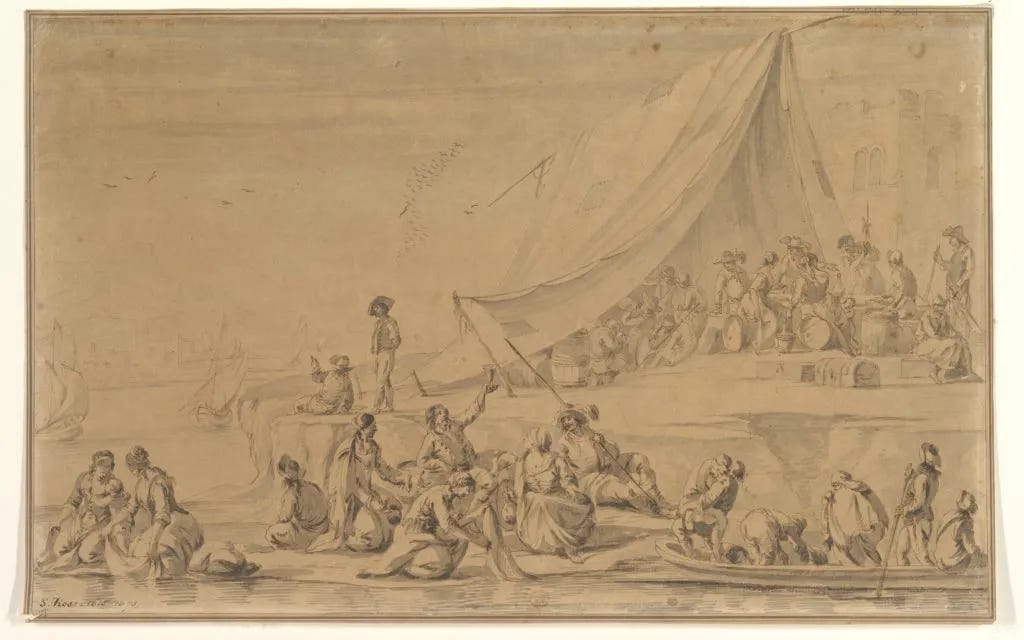You are lost. From the thick dense humid heart of the static now, all is stifling, not languid but stuck, sickly. You sit dying for some water, a drop of rain, the slightest hint of mist from the sea, but there is nothing.
Death lost in a suffocating jungle landscape, hemmed round by disease and despair.
I read once about a crew of pirates crossing a deserted wild island in the Caribbean to find a spot that gave them advantage to attack a better armed vessel by surprise from behind, and hence, seize the treasure. They tramped, sweated, and dragged through the heart of thick foliage, full of dangerous snakes, swarming insects, sharp branches and vines that cut them to shreds as they bled their way to what they hoped would be the proper destination. Some died of thirst or heat exhaustion before the journey’s end, unable to survive on the few sips of water in their remaining stash. Their companions left their bodies to sink into oblivion, lost to history in vain. Others lived and seized the prize after killing the sailors and capturing the ship. A good number of the men onboard, mostly slaves or indentured servants, surrendered and joined the pirates rather than die with their captors.
You have escaped. Only the most remote spot will suit you. There is no plan, only desperate flight and the hope of a safe landing. Anywhere but here.
Death on a barren black rock.
Historian Rebecca Simon observes that “Tortuga and Jamaica became infamous pirate havens despite the fact that English law was formally declared in Jamaica in 1664 and again in 1674. These islands discouraged sailors who were unfamiliar with their geography because of their dangerous coastlines. The isolated region and the difficult terrain made the islands attractive to drifters, escaped enslaved people (who fled into the mountains and formed ‘maroon’ communities), indentured servants, transported criminals, prostitutes, religious dissenters or minorities, criminals, religious radicals and political prisoners, who gained newfound freedom in these areas.”
The brutal life of pirates was born of oppression and poverty. They were abused aboard man-o’- wars, badly fed, beaten, and underpaid. Although the price for piracy was usually sure execution if captured, many risked it freely to escape their lot on a ship or in other forms of bondage.
Death in a torpid prison cell amid a charred landscape, lost to the maps.
Death hanging in chains from a tree.
Death transported back to port to be hung by the neck.
As Simon tells it, “Pirate ships were often egalitarian communities in which the crew could vote a captain in or out depending on conditions and successes. These communities were not beholden to anyone else or to specific laws or governments. They considered themselves to be their own nations rather than obligated to a mother country. Not only that, they were not tied to social norms. Pirates were known to frequently blaspheme, swear, curse, drink excessively, and enter violent encounters without any fear of death.”
They broke all social and sexual norms.
They chose piracy over beggary.
They formed alternative societies.
They sang their way to hell.
You are free. The trades lift slowly and with them comes the smell of the wide-open ocean, a hint of distant cool and freedom of motion. Your hair blows gently at first and then wildly, until you are disheveled and liberated to face the world unburdened and full of unspeakable glee as seabirds fiercely glide on the rising tempest.
Note on the Summer Chronicles:
Over a decade ago, during my time writing for the OB Rag and SD Free Press, I penned a series of pieces over the summer that moved beyond the blog/column form to something a little looser and more open to improvisation and the poetic turn.
Below is the original preface for the first series of chronicles:
In the summer of 1967, the great Brazilian writer, Clarice Lispector, began a seven year stint as a writer for Jornal de Brasil [The Brazilian News ] not as a reporter but as a writer of "chronicles," a genre peculiar to Brazil. As Giovanni Pontiero puts it in the preface to Selected Chrônicas, a chronicle, "allows poets and writers to address a wider readership on a vast range of topics and themes. The general tone is one of greater freedom and intimacy than one finds in comparable articles or columns in the European or U.S. Press."
What Lispector left us with is an eccentric collection of "aphorisms, diary entries, reminiscences, travel notes, interviews, serialized stories, essays, loosely defined as chronicles." As a novelist, Pontiero tells us, Lispector was anxious about her relationship with the genre, apprehensive of writing too much and too often, of, as she put it, "contaminating the word." It was a genre alien to her introspective nature and one that challenged her to adapt.
More than forty years later, in Southern California—in San Diego no less—I look to Lispector with sufficient humility and irony from my place on the far margins of literary history with three novels and a few other books largely set in our minor league corner of the universe. Along with this weekly column, it's not much compared to the gravitas of someone like Lispector. So, as Allen Ginsberg once said of Whitman, "I touch your book and feel absurd."
Nonetheless the urge to narrate persists. Along with Lispector, I am cursed with it—for better or worse. So for a few lazy weeks of summer, I will try my hand at the form.
Originally posted at The Jumping Off Place






